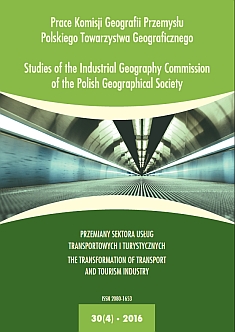International Determinants of the Negative Consequences of Tourism in Krakow
DOI:
https://doi.org/10.24917/20801653.304.13Keywords:
attitudes, motives, tourism, tourism dysfunctionsAbstract
Leisure and tourism usually have a positive connotation and is rarely associated with negative consequences. Undertaking the subject of tourist dysfunction stems from the fact that contemporary tourism is increasingly prone to generating a variety of negative social consequences. The aim of the research was to show the type of dysfunction and international determinants of the negative consequences of tourist traffic in Krakow. In the empirical part of the paper the analysis of the size of tourist traffic was made through which common motivation of tourists arriving in Krakow was identified. On the basis of surveys and interviews, identified were three categories of attitudes of residents in respect to destructive behaviour of tourists.
Downloads
Metrics
References
Alejziak, W. (2000). Turystyka w obliczu wyzwań XXI wieku. Kraków: Wydawnictwo Albis.
Anszpanger, A. (2013). Efektywność lokalnych systemów turystycznych. Zeszyty Naukowe Uniwersytetu Ekonomicznego w Katowicach, 156.
Borkowski, K., Grabiński, T., Seweryn, R., Wilkowska, A., Mazanek, L., Grabińska, E. (2014). Ruch turystyczny w Krakowie. Rok 2014. Kraków: Małopolska Organizacja Turystyczna.
Butler, R.W. (1980). The Concept of a Tourism and Cycle of Evolution. Canadian Geographer, 24.
Chmielecki, O. (2014). Ruch turystyczny w Krakowie w 2014 roku. Biuletyn Informacji Publicznej.
Doxey, G.V. (1976). When Enough’s Enough: the Natives Are Restless in Old Niagara. Heritage Canada, 2.
Gaworecki, W. (1997). Turystyka. Warszawa: Polskie Wydawnictwo Ekonomiczne.
Hawrot, K. (2015, 27 kwietnia). Zagraniczne święte krowy? Mieszkańcy skarżą się na zachowanie turystów. Wirtualna Polska. Pozyskano z http://wiadomosci.wp.pl/kat,1019401,title,Zagraniczne-swiete-krowy-w-Krakowie-Mieszkancy-skarza-sie-na-zachowanie-turystow,wid,17158061,wiadomosc.html?ticaid=1184af
Łobożewicz, T., Bieńczyk, G. (2001). Podstawy turystyki. Warszawa: Wydawnictwo Wyższej Szkoły Ekonomicznej.
Kozak, M. (2009). Turystyka i polityka turystyczna a rozwój: między starym a nowym paradygmatem. Warszawa: Wydawnictwo Naukowe Scholar.
Kurek, W. (2007). Turystyka. Warszawa: PWN.
Kwilecki, K. (2013). Funkcje, motywy i potrzeby w turystyce. Materiały Ogólnopolskiej Konferencji Naukowej pt. „Współczesne trendy w hotelarstwie, gastronomii i turystyce międzynarodowej”. Poznań.
Mathieson, A., Wall, G. (1982). Tourism. Economic, Physical and Social Impact. Harlow: Longman Scientific and Technical.
Pik, A. (2009). Clubbing – sposób na życie czy ucieczka od odpowiedzialności? Biuletyn Akademii Górniczo-Hutniczej, 18–19.
Pike, S. (2011). Destination Marketing Organisations. New York: Routledge.
Przecławski, K. (2004). Człowiek a turystyka. Zarys socjologii turystyki. Kraków: Wydawnictwo Albis.
Sala, J. (2012). Miasta jako cel podróży turystycznych. W: T. Żabińska (red.). Turystyka na obszarach miejskich. Uwarunkowania rozwoju. Narzędzia promocji. Katowice: Wydawnictwo Uniwersytetu Ekonomicznego.
Strategia rozwoju turystyki w Krakowie na lata 2014–2020 (2014). Kraków: Urząd Miasta Krakowa.
Żabińska, T. (red.) (2012). Turystyka na obszarach miejskich. Uwarunkowania rozwoju. Narzędzia promocji. Katowice: Wydawnictwo Uniwersytetu Ekonomicznego.
Downloads
Published
How to Cite
Issue
Section
License
Articles are published under the terms of the Creative Commons License (CC BY-ND 4.0; Attribution– NoDerivs).

